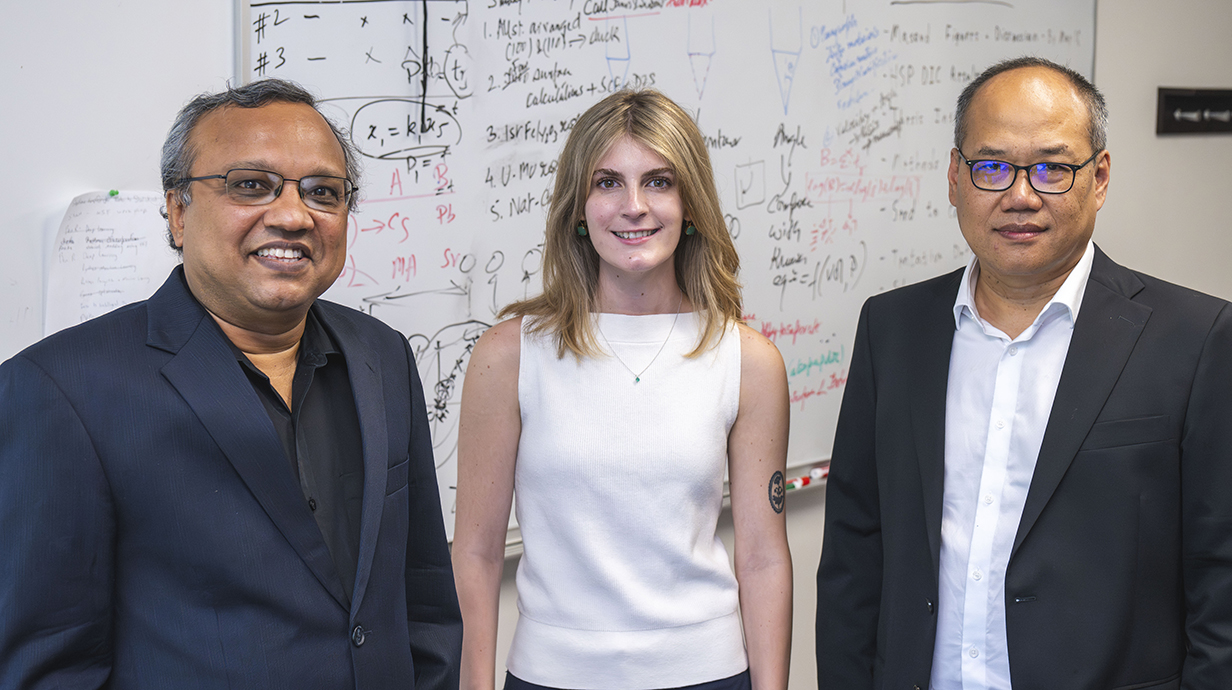Leadership fellowship to fund education, research
OXFORD, Miss. â The U.S. Department of Energy selected University of Mississippi graduate student Abigail Hogue for its University Nuclear Leadership Program graduate research fellowship, where she will use artificial intelligence to help improve nuclear fuel development.
The University Nuclear Leadership Program fellowship offers $175,000 to fund three years of a student's education and research. It includes a 10-week internship at a DOE national laboratory.
Hogue, a first-year master's student in materials science from Brandon, will use her fellowship to study ways machine learning can help scientists develop stable, efficient nuclear energy.
"Nuclear energy is also a lot more energy-dense than fossil fuels – and it's much safer than people think," she said. "Moving away from fossil fuels is really important, and if we can improve nuclear energy and get the most out of it that we possibly can, that's the way we move forward for the future."
Samrat Choudhury, associate professor of mechanical engineering and Hogue's adviser, said this fellowship will help propel her into a career in nuclear energy.
"This is a very prestigious, nationally competitive graduate fellowship," Choudhury said. "That itself is a big honor. But more than that, it provides her an opportunity to work in the field of her choice with the top scientists in that field, and it's developing the next generation of nuclear energy workforce."

Samrat Choudhury (left), associate professor of mechanical engineering, and Xiaopeng Zhao (right), chair and professor of mechanical engineering, congratulate master's student Abigail Hogue on being selected as a fellow in the Department of Energy’s University Nuclear Leadership Program. Hogue will continue her research and work with experts in the field at a national laboratory. Photo by Srijita Chattopadhyay/Ole Miss Digital Imaging Services
Nuclear energy is created by splitting atoms in a reactor. This process releases heat that is used to generate electricity. But as nuclear energy is being used, both the fuel and structural materials often go through multiple changes at the structural level.
Hogue's research will use machine learning to go through the vast data sets of information about nuclear energy and help scientists better understand the behavior of the energy under different external conditions.
"When the fuels evolve and the microstructure changes, it affects the properties of the fuel itself," she said. "Thermal conductivity and structural integrity – all sorts of things like that are changing as the fuel is being used in the reactor.
"That's what we're trying to understand, and understanding that is really important because you don't want your fuel to fail."
Using artificial intelligence to help parse and decipher the data will offer researchers a more nuanced understanding of nuclear energy's behavior, Hogue said.
"I'm developing a model that will take these huge sets of raw data, which are really hard to process as a human, and find patterns so we can figure out how the fuels are going to evolve," she said.
Hogue is set to complete her 10-week internship at the Los Alamos National Laboratory, where she can work with experts in the field.
"Data centers for AI are going to take a significant amount of energy and instead of building big reactors, we are now focusing on small modular reactors that can be placed close to the data centers so they can support AI innovation," Choudhury said.
"In that context, we need to develop new materials and fuels that can support the design of small modular reactors, and we need to develop it quickly. That's what Abby's research is planning to contribute to."
A former Stamps Impact Prize recipient and intern at the Center for Space Nuclear Research, Hogue has already spent much time in the lab as an undergraduate.
"It's been so beneficial for me in the long term to have been involved in research so early," she said. "I started doing research early because I knew that's what I wanted to do. I want to work in a national lab, whether that's Los Alamos or the Idaho National Lab."
The university joined the University Nuclear Leadership Program in 2023, and Hogue is the second Ole Miss student selected for this graduate fellowship.
"She has been preparing herself for this kind of nuclear energy research for quite some time," Choudhury said. "She's been in the lab since she was an undergraduate; she's contributed to publications, and she has presented her research at international conferences on this topic in front of the experts from top universities. So far, her research contributions go above and beyond the typical undergraduate student."
Top: Abigail Hogue, a master's student in materials science, explains her research on graph neural networks and their utility in studying nuclear materials. Hogue, who has been active in nuclear research for several years, has been selected to the Department of Energy’s University Nuclear Leadership Program. Photo by Srijita Chattopadhyay/Ole Miss Digital Imaging Services
Office, Department or Center
Published
September 17, 2025
